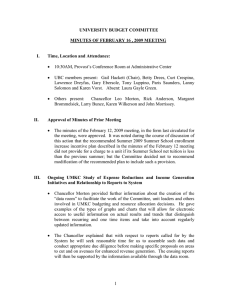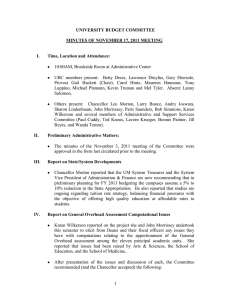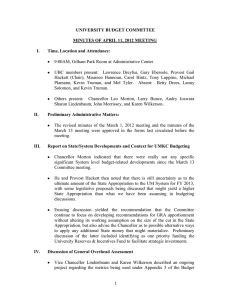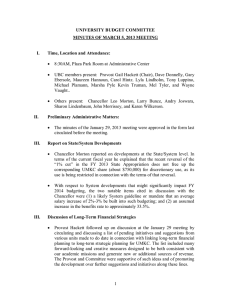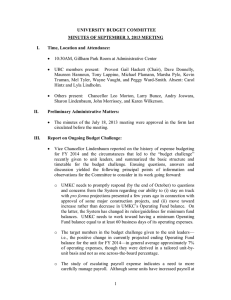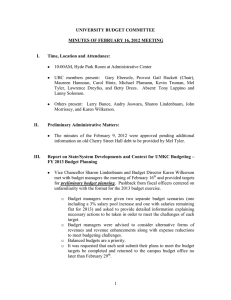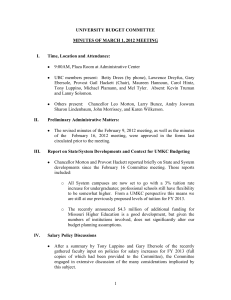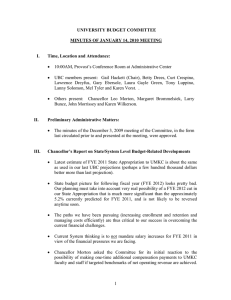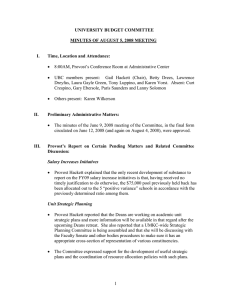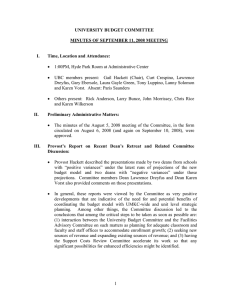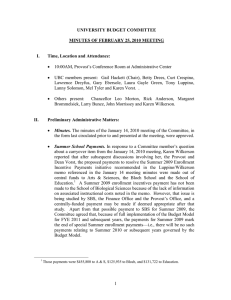• 10:00AM, Brookside Room at Administrative Center I.
advertisement
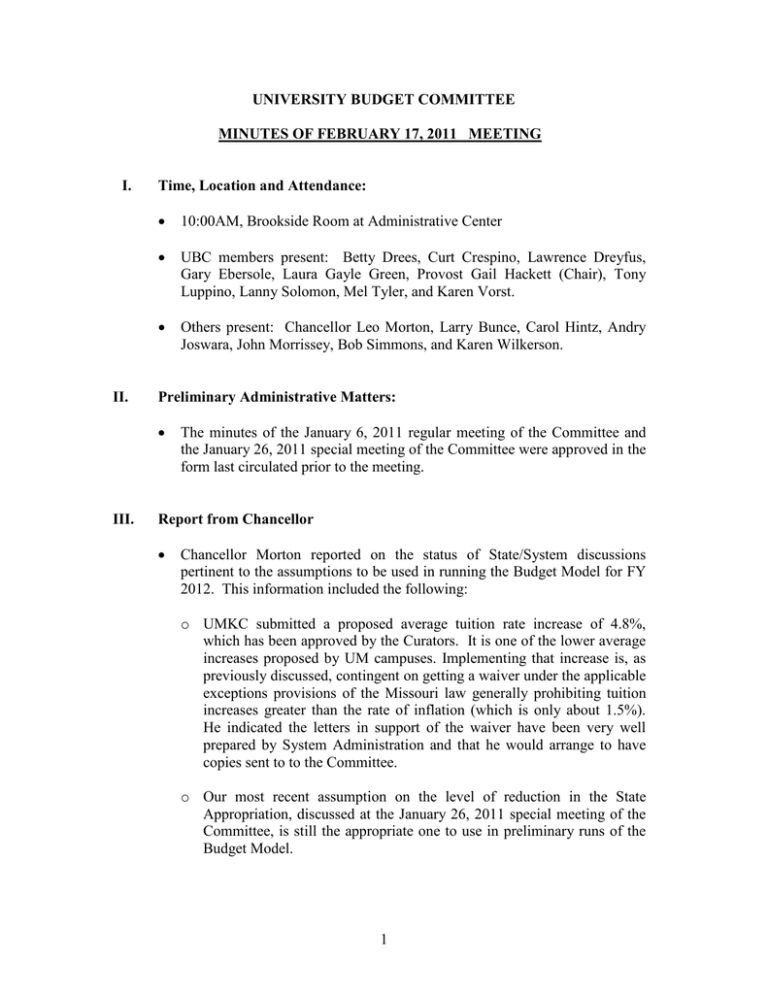
UNIVERSITY BUDGET COMMITTEE MINUTES OF FEBRUARY 17, 2011 MEETING I. II. Time, Location and Attendance: • 10:00AM, Brookside Room at Administrative Center • UBC members present: Betty Drees, Curt Crespino, Lawrence Dreyfus, Gary Ebersole, Laura Gayle Green, Provost Gail Hackett (Chair), Tony Luppino, Lanny Solomon, Mel Tyler, and Karen Vorst. • Others present: Chancellor Leo Morton, Larry Bunce, Carol Hintz, Andry Joswara, John Morrissey, Bob Simmons, and Karen Wilkerson. Preliminary Administrative Matters: • III. The minutes of the January 6, 2011 regular meeting of the Committee and the January 26, 2011 special meeting of the Committee were approved in the form last circulated prior to the meeting. Report from Chancellor • Chancellor Morton reported on the status of State/System discussions pertinent to the assumptions to be used in running the Budget Model for FY 2012. This information included the following: o UMKC submitted a proposed average tuition rate increase of 4.8%, which has been approved by the Curators. It is one of the lower average increases proposed by UM campuses. Implementing that increase is, as previously discussed, contingent on getting a waiver under the applicable exceptions provisions of the Missouri law generally prohibiting tuition increases greater than the rate of inflation (which is only about 1.5%). He indicated the letters in support of the waiver have been very well prepared by System Administration and that he would arrange to have copies sent to to the Committee. o Our most recent assumption on the level of reduction in the State Appropriation, discussed at the January 26, 2011 special meeting of the Committee, is still the appropriate one to use in preliminary runs of the Budget Model. 1 o The System is still contemplating a mandate of 2% average increase in salaries for FY 2012. Provost Hackett noted that the current thinking is that this would not be an across-the-board 2%, but rather would involve merit-based assignment of salary increases that add up to the 2% under a “pool” concept. o One Committee member asked if analysis was being done of faculty productivity data, and it was reported that applicable groups are taking such data into consideration in strategic planning. IV. Refining Other Budget Model Assumptions • Following the Chancellor’s report, Karen Wilkerson circulated a first run of the Budget Model for FY 2012 as a starting place for discussion of finalizing FY 2012 GRA apportionment with whatever adjustments may ultimately prove to be in order. She explained what data had been updated so far and identified various issues that need to be resolved, including several the Committee has discussed in prior meetings, but on which work is continuing by subgroups. • Ensuing discussion produced the following information and plans: o Kansas Exchange. Provost Hackett reported that the Kansas Exchange arrangement has been renewed for another 5-year term because, on an overall basis, the University of Missouri sees benefits commensurate with its costs. However, she noted that UMKC had squarely raised the issue of whether UMKC is bearing a disproportionately large share of those costs through the mandated nonresident tuition waivers to students from Kansas enrolling in our Dental School. So, while we need to retain our off-the-top allocation for this item in the Budget Model for FY 2012, there will be ongoing analysis of the UMKC cost issue, which she noted is a rather complex matter to quantify on a net basis. We hope this study will result in the System giving UMKC some relief on this item in the future. o Attribution of Undergraduate Scholarships. The small group working on this issue includes Mel Tyler, Karen Wilkerson, and Deans Dreyfus, Truman and Vorst. They have been further refining their analysis, but are not yet in a position to make recommendations to the Committee regarding possible changes in how the scholarship attribution aspect of the Budget Model is applied among units teaching or advising undergraduates in situations where strict application of a “home unit” approach under Appendix 2 of the Budget Model may generate inappropriate financial impacts. 2 o Possible Conservatory Adjustments. The Chancellor, Provost, and Karen Wilkerson are continuing to follow up with Dean Witte and his staff on the range of possibilities identified at the January 26, 2011 special meeting of the Committee, with a meeting scheduled for a few hours after this February 17 Committee meeting. o Overall Amount of General Overhead Assessment. For initial discussion purposes the first run of the Budget Model for FY 2012 reflects a 7% cut from the FY 2011 figure on the size of the General Overhead Assessment charged to the eleven principal academic units. It was agreed that the 93% figure (approximately $62.3 million) will be used in preliminary runs of the Budget Model, but is subject to change after further study of the unit budgets of various functions representing line items within the General Overhead Assessment, and the associated impacts. Karen Wilkerson and Bob Simmons explained that some items cannot as a practical matter be cut (e.g., utilities), so this process will necessitate rigorous examination of which functions can reasonably be asked to absorb cuts and which cannot. During this discussion the Committee approved the merger of its Support Costs Review Committee with the 2020 Task Force’s Administrative & Support Services Committee, and agreed that the merged committee should work with the Chancellor and his staff on the exploration of the General Overhead Assessment for FY 2012. o Sharing of General Overhead Assessment among Academic Units. In addition to the previously identified issue of the proper assignment of costs from the White Recital Hall (which is being considered in the above-described study of the Conservatory’s financial circumstances), Dean Vorst presented two issues for Committee discussion. --The first related to the people and space associated with the approximately $723,600 item identified within the General Overhead Assessment as “Arts and Sciences Campuswide Support”. On that issue, the Committee recommended that to the extent the people and space in question are devoted to just the functions within that item (as opposed to performing other work for A&S or providing space for A&S-specific uses), (i) those people should be excluded from the people counts for A & S in formulae in Appendix 5 using people counts, and (ii) that space should be treated as central, not A&S space. --The second issue related to how Graduate Teaching Assistants are classified for various people count measures in Appendix 5 formulae. One question is whether they are being inappropriately doublecounted as both students and employees. Committee members observed that (i) this question is relevant to GTAs in many units; and 3 (ii) depending on the particular support function being taxed it may be appropriate to count GTAs as both students for some purposes and employees for other purposes (for example, there may be some HR costs associated with their employee status). Accordingly, it was agreed that a small group would study this issue on a support function-by-support function basis and make recommendations to the Committee. Deans Drees, Dreyfus and Vorst agreed to work with Karen Wilkerson as that small group. V. Refining Process and Timetable for Recommendations Re: FY 2012 Budgeting • VI. The Committee agreed that given the significance of the items described in IV above on which small groups are working, all of those groups should be asked to complete their work and make associated recommendations to the Committee for discussion at its next regularly scheduled meeting. Administrative Matters Going Forward • The next meeting of the Committee will be March 17, 2011. 4
